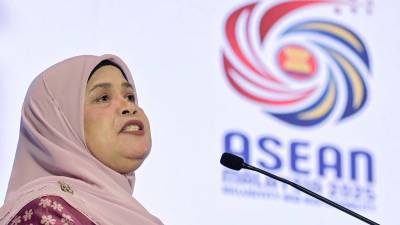KUALA LUMPUR: ASEAN and its Plus Three partners must strengthen collaboration in empowering women through digitalisation by focusing on capacity-building, innovation, and cross-border platforms.
Deputy Minister of Rural and Regional Development Datuk Rubiah Wang proposed three key areas of cooperation for the region’s way forward in supporting women’s empowerment through technology.
She emphasised that capacity-building should involve sharing training programmes and digital literacy modules so that rural women in all countries can benefit from best practices.
Rubiah also highlighted the need for funding and innovation hubs to explore potential support for women-led start-ups, cooperatives, and enterprises with easier access to finance, technology, and mentorship.
The third area focuses on regional platforms through promoting cross-border e-commerce to give rural women entrepreneurs access to bigger markets within ASEAN and East Asia.
She stressed that no single country can succeed alone as digitalisation moves fast and collaboration is key.
Rubiah reaffirmed Malaysia’s commitment to working closely with ASEAN and its Plus Three partners to build a digital future that leaves no woman, family, or community behind.
She stated that when rural women prosper, rural communities prosper, and when rural communities prosper, nations become stronger and more resilient.
Digital tools enable rural women to sell products, learn skills, access health information, and reach new markets according to the deputy minister.
Rubiah emphasised that digitalisation is not just technology but represents opportunity, empowerment, and equality for women across the region.
Citing the ASEAN Framework Action Plan on Rural Development and Poverty Eradication (2021-2025), she said ASEAN’s collective aspiration is for women not only to benefit from digitalisation but also to take the lead in shaping it.
The action plan mandates institutional mechanisms to promote participation of women in rural development and decision-making, ensuring that development does not leave women behind.
She added that the ASEAN Digital Masterplan 2025 complements these goals by targeting inclusive digital transformation and bridging the digital divide.
The Declaration on Gender-Responsive Implementation of the ASEAN Community Vision 2025 reinforces regional commitment to ensuring women are not left behind in the digital economy.
From Malaysia’s perspective, Rubiah said the government has made significant strides in rural digitalisation through the JENDELA initiative.
JENDELA enhances broadband quality and coverage to close the digital divide, particularly in underserved areas across Malaysia.
The initiative has registered notable achievements with some even exceeding original targets, including connecting 839 rural and Orang Asli communities via satellite.
According to the Department of Statistics Malaysia 2024 data, internet access among rural households rose to 90.3% in 2024, up from 89.8% in 2023.
Urban households showed 98.8% internet access in the same period, indicating progress in bridging the digital divide.
Rubiah also highlighted the ministry’s Desamall online platform which connects rural entrepreneurs to wider markets.
Since its inception in 2019, Desamall has successfully onboarded over 7,100 entrepreneurs, with over 80% being women entrepreneurs.
She said the Entrepreneur Digitisation Programme has equipped 4,450 entrepreneurs with essential digital business skills, including market access, financing, and content creation.
Through the ministry’s training arm, Institute of Rural Advancement, various training and leadership programmes are being implemented to strengthen women’s participation in the digital economy.
In conjunction with Malaysia’s ASEAN Chairmanship 2025, two major events brought together over 100 participants from ASEAN and Plus Three countries.
The ASEAN Multistakeholder Dialogue on the ASEAN Master Plan on Rural Development was held on October 7-8.
The ASEAN+3 Forum on Women and Digitalisation held on October 9 discussed strategies to bridge the digital divide and promote gender equality.
The dialogue session aimed at strengthening implementation of the ASEAN Master Plan on Rural Development, focusing on promoting regional cooperation for sustainable and inclusive rural transformation.
The forum session explored challenges faced by rural women in accessing digital technology, education, and financial services across the ASEAN region. – Bernama
